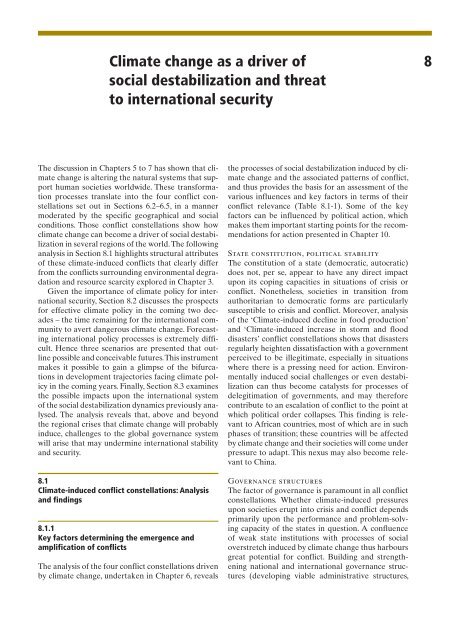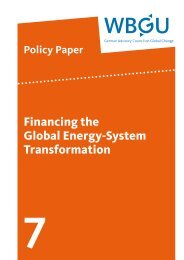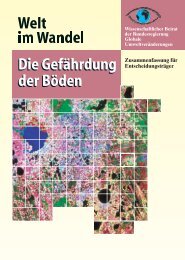World in Transition: Climate Change as a Security Risk - WBGU
World in Transition: Climate Change as a Security Risk - WBGU
World in Transition: Climate Change as a Security Risk - WBGU
Create successful ePaper yourself
Turn your PDF publications into a flip-book with our unique Google optimized e-Paper software.
<strong>Climate</strong> change <strong>as</strong> a driver of<br />
social destabilization and threat<br />
to <strong>in</strong>ternational security<br />
The discussion <strong>in</strong> Chapters 5 to 7 h<strong>as</strong> shown that climate<br />
change is alter<strong>in</strong>g the natural systems that support<br />
human societies worldwide. These transformation<br />
processes translate <strong>in</strong>to the four conflict constellations<br />
set out <strong>in</strong> Sections 6.2–6.5, <strong>in</strong> a manner<br />
moderated by the specific geographical and social<br />
conditions. Those conflict constellations show how<br />
climate change can become a driver of social destabilization<br />
<strong>in</strong> several regions of the world. The follow<strong>in</strong>g<br />
analysis <strong>in</strong> Section 8.1 highlights structural attributes<br />
of these climate-<strong>in</strong>duced conflicts that clearly differ<br />
from the conflicts surround<strong>in</strong>g environmental degradation<br />
and resource scarcity explored <strong>in</strong> Chapter 3.<br />
Given the importance of climate policy for <strong>in</strong>ternational<br />
security, Section 8.2 discusses the prospects<br />
for effective climate policy <strong>in</strong> the com<strong>in</strong>g two decades<br />
– the time rema<strong>in</strong><strong>in</strong>g for the <strong>in</strong>ternational community<br />
to avert dangerous climate change. Forec<strong>as</strong>t<strong>in</strong>g<br />
<strong>in</strong>ternational policy processes is extremely difficult.<br />
Hence three scenarios are presented that outl<strong>in</strong>e<br />
possible and conceivable futures. This <strong>in</strong>strument<br />
makes it possible to ga<strong>in</strong> a glimpse of the bifurcations<br />
<strong>in</strong> development trajectories fac<strong>in</strong>g climate policy<br />
<strong>in</strong> the com<strong>in</strong>g years. F<strong>in</strong>ally, Section 8.3 exam<strong>in</strong>es<br />
the possible impacts upon the <strong>in</strong>ternational system<br />
of the social destabilization dynamics previously analysed.<br />
The analysis reveals that, above and beyond<br />
the regional crises that climate change will probably<br />
<strong>in</strong>duce, challenges to the global governance system<br />
will arise that may underm<strong>in</strong>e <strong>in</strong>ternational stability<br />
and security.<br />
8.1<br />
<strong>Climate</strong>-<strong>in</strong>duced conflict constellations: Analysis<br />
and f<strong>in</strong>d<strong>in</strong>gs<br />
8.1.1<br />
Key factors determ<strong>in</strong><strong>in</strong>g the emergence and<br />
amplification of conflicts<br />
The analysis of the four conflict constellations driven<br />
by climate change, undertaken <strong>in</strong> Chapter 6, reveals<br />
the processes of social destabilization <strong>in</strong>duced by climate<br />
change and the <strong>as</strong>sociated patterns of conflict,<br />
and thus provides the b<strong>as</strong>is for an <strong>as</strong>sessment of the<br />
various <strong>in</strong>fluences and key factors <strong>in</strong> terms of their<br />
conflict relevance (Table 8.1-1). Some of the key<br />
factors can be <strong>in</strong>fluenced by political action, which<br />
makes them important start<strong>in</strong>g po<strong>in</strong>ts for the recommendations<br />
for action presented <strong>in</strong> Chapter 10.<br />
State constitution, political stability<br />
The constitution of a state (democratic, autocratic)<br />
does not, per se, appear to have any direct impact<br />
upon its cop<strong>in</strong>g capacities <strong>in</strong> situations of crisis or<br />
conflict. Nonetheless, societies <strong>in</strong> transition from<br />
authoritarian to democratic forms are particularly<br />
susceptible to crisis and conflict. Moreover, analysis<br />
of the ‘<strong>Climate</strong>-<strong>in</strong>duced decl<strong>in</strong>e <strong>in</strong> food production’<br />
and ‘<strong>Climate</strong>-<strong>in</strong>duced <strong>in</strong>cre<strong>as</strong>e <strong>in</strong> storm and flood<br />
dis<strong>as</strong>ters’ conflict constellations shows that dis<strong>as</strong>ters<br />
regularly heighten dissatisfaction with a government<br />
perceived to be illegitimate, especially <strong>in</strong> situations<br />
where there is a press<strong>in</strong>g need for action. Environmentally<br />
<strong>in</strong>duced social challenges or even destabilization<br />
can thus become catalysts for processes of<br />
delegitimation of governments, and may therefore<br />
contribute to an escalation of conflict to the po<strong>in</strong>t at<br />
which political order collapses. This f<strong>in</strong>d<strong>in</strong>g is relevant<br />
to African countries, most of which are <strong>in</strong> such<br />
ph<strong>as</strong>es of transition; these countries will be affected<br />
by climate change and their societies will come under<br />
pressure to adapt. This nexus may also become relevant<br />
to Ch<strong>in</strong>a.<br />
Governance structures<br />
The factor of governance is paramount <strong>in</strong> all conflict<br />
constellations. Whether climate-<strong>in</strong>duced pressures<br />
upon societies erupt <strong>in</strong>to crisis and conflict depends<br />
primarily upon the performance and problem-solv<strong>in</strong>g<br />
capacity of the states <strong>in</strong> question. A confluence<br />
of weak state <strong>in</strong>stitutions with processes of social<br />
overstretch <strong>in</strong>duced by climate change thus harbours<br />
great potential for conflict. Build<strong>in</strong>g and strengthen<strong>in</strong>g<br />
national and <strong>in</strong>ternational governance structures<br />
(develop<strong>in</strong>g viable adm<strong>in</strong>istrative structures,<br />
8
















